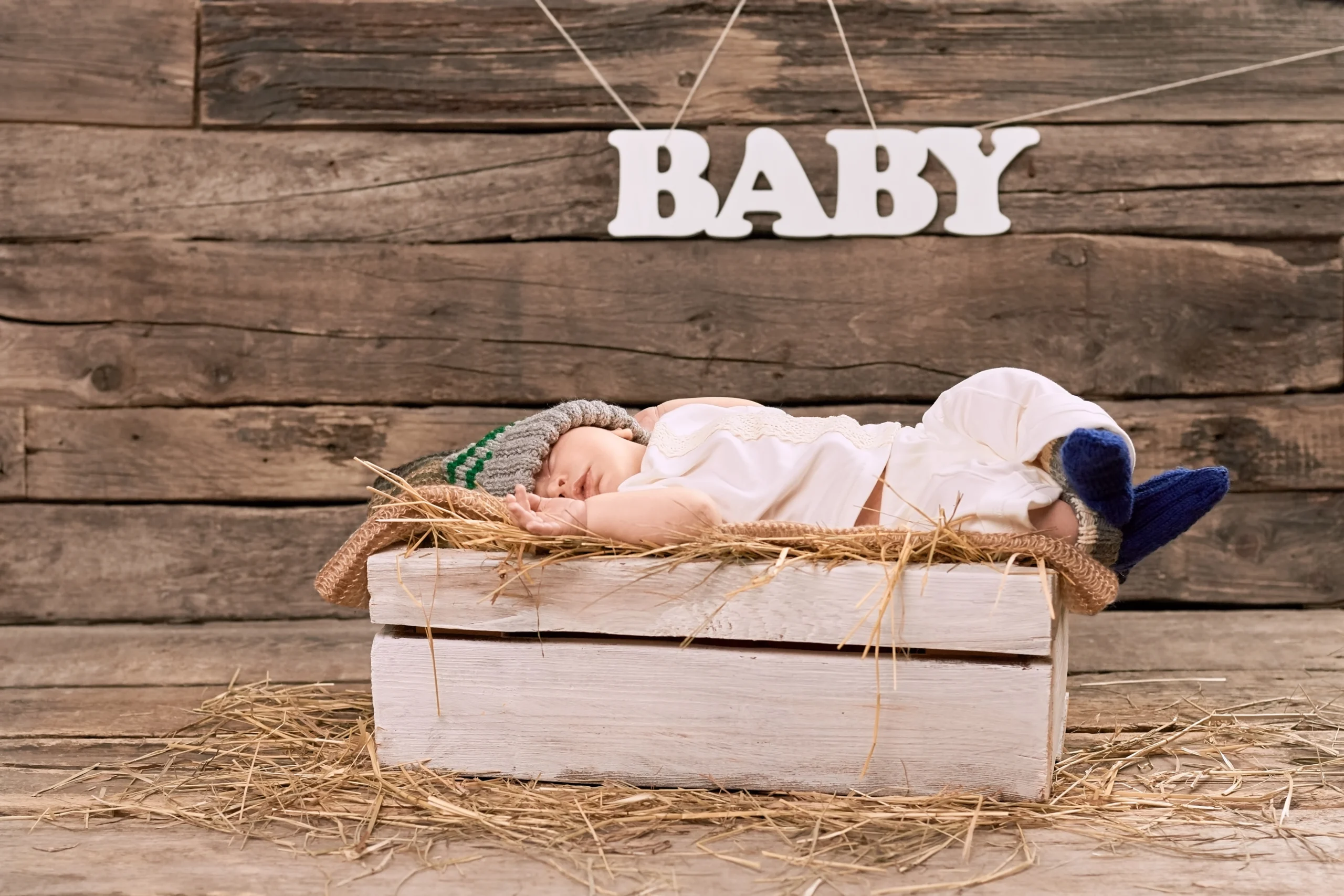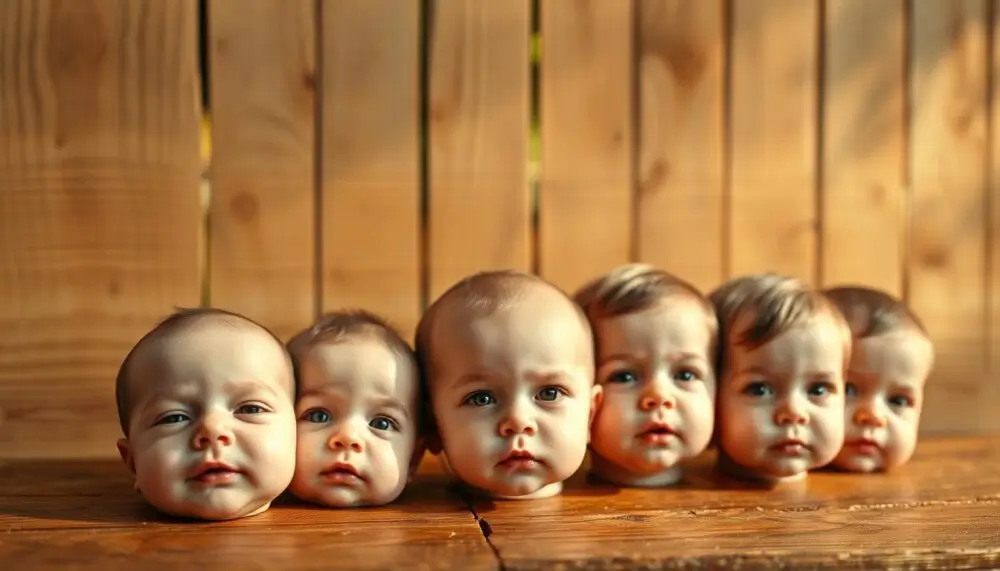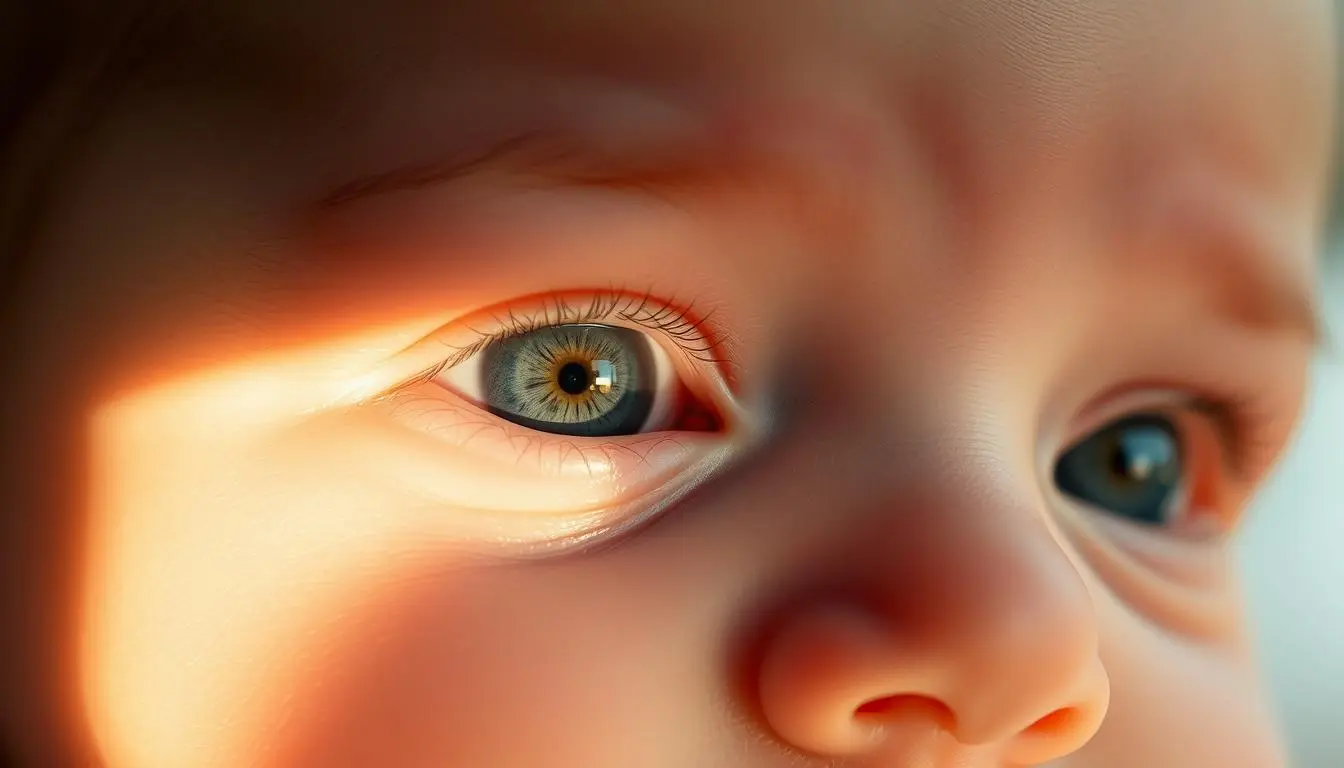When Do Babies Start Cooing? Seeing your baby’s first coos is an unforgettable experience. It shows their language skills are growing. I remember the happiness when I heard my baby’s first coos. It was the start of their journey to talk.
Cooing is one of the first ways babies communicate, starting a few months after birth. It’s a key baby development sign that shows they’re learning sounds and how to talk. In this article, we’ll look at why cooing is important for babies and what to expect as they grow.
Key Takeaways
- Cooing is a significant baby milestone indicating language development.
- Babies typically start cooing a few months after birth.
- Cooing is a key sign of infant development and communication.
- Understanding cooing helps parents support their baby’s language skills.
- Cooing is an early sign of a baby’s ability to communicate effectively.
👶 Must-Have Baby Products Every Parent Needs – Shop Top Picks on Amazon
From newborn essentials to toddler favorites, the right baby products can make parenting smoother, safer, and even more joyful. Whether you’re shopping for your own little one or picking the perfect baby shower gift, we’ve got you covered!
🍼 Diapers, wipes, bottles & feeding gear
🛏️ Cribs, bassinets, baby monitors & nursery must-haves
🧴 Lotions, shampoos & sensitive-skin baby care
🎁 Gift sets, toys & accessories
👉 Browse the best baby products on Amazon
✔️ Trusted brands like Pampers, Enfamil, Aveeno Baby, and Graco
✔️ Parent-approved with thousands of 5-star reviews
✔️ Fast delivery & easy returns
Everything you need for baby’s first year — all in one place. 💗
Understanding Baby Cooing: The First Vocal Milestone
Cooing is a key early sound babies make, starting their language journey. It shows they’re learning to talk.
What Exactly Is Cooing?
Cooing are soft, vowel-like sounds babies make when happy or trying to talk. These are the first forms of vocal expression and are key for language skills.
Why Cooing Matters in Development
Cooing is more than a nice sound; it’s a big part of a baby’s growth. It shows they’re learning sounds and communication. This early sound is a step towards talking and babbling.
How Cooing Differs from Crying and Other Reflexive Sounds
While crying is a reflex to need or discomfort, cooing is more controlled. Cooing sounds are soft and melodic, unlike the loud cries of distress. Knowing the difference helps parents meet their baby’s needs and encourage talking early.
Some key differences between cooing and other sounds include:
- The tone: Cooing is softer and more melodic.
- The context: Cooing happens during interactions or when the baby is happy.
- The sound production: Cooing involves more controlled vocal cord vibrations.
When Do Babies Start Cooing: The Typical Timeline
Parents eagerly wait for their baby’s first coos. It’s a big step in their development. Cooing is more than just a sound; it shows a baby’s vocal growth.
The Average Age Range for First Coos
Babies usually start cooing between 6 to 8 weeks old. They make vowel sounds, like cooing or gooing. This is when they start playing with sounds.
Experts say, “The cooing stage is key for language skills. It sets the stage for talking later.”
“The cooing stage is a critical period in language development, laying the groundwork for future communication skills.”
— Dr. Jane Smith, Child Development Specialist
Individual Differences in Cooing Development
Every baby grows at their own pace. Some coo early, others later. Things like genetics and health play a part.
Factors That May Influence When Cooing Begins
Things like being born early, hearing issues, and language exposure can affect cooing. Knowing this helps parents support their baby’s growth.
| Factor | Influence on Cooing |
|---|---|
| Premature Birth | May delay cooing onset |
| Hearing Impairments | Can significantly impact cooing development |
| Environmental Factors | Exposure to language can encourage cooing |
Knowing when babies coo and why helps parents see their baby’s growth. Cooing is just the start of a baby’s vocal journey.
The Stages of Baby Cooing Development
Babies go through different stages of cooing as they grow. Each stage is a big step in their ability to talk. It shows how they start to communicate.
Early Reflexive Sounds (0-2 months)
In the first few months, babies make sounds that aren’t really for talking. These sounds come from them trying out their vocal cords.
True Cooing Begins (2-4 months)
Between 2 to 4 months, babies start to make sounds on purpose. They make vowel sounds and sometimes consonants too. This is a big step towards learning language.
Advanced Cooing and Vocal Play (4-6 months)
When babies are 4 to 6 months old, their cooing gets better. They make more sounds and try out different ways of speaking. This is when they really start to play with sounds.
From Cooing to Babbling: The Next Step (6+ months)
By 6 months, babies usually start babbling. Babbling is when they make sounds that are like words. It’s a big change from just cooing.
Key milestones in baby cooing stages include:
- Reflexive sounds in the first two months
- Intentional cooing between 2-4 months
- Vocal play and advanced cooing at 4-6 months
- The transition to babbling around 6 months

How Cooing Relates to Other Developmental Milestones
Cooing in babies is the start of a complex journey. It connects with other developmental achievements. As they make sounds, they’re not just talking. They’re also preparing for future milestones.
Cooing and Social Development
Cooing is key in a baby’s social growth. It’s one of the first ways a baby talks to their caregivers. When a baby coos, it makes parents want to talk back. This creates a cycle of interaction that helps with bonding and learning social skills.
This early talk is vital for emotional smarts and understanding social hints.

Cooing and Cognitive Growth
Cooing also helps with thinking skills. Babies trying out different sounds learn about cause and effect. They’re also improving their hearing skills.
This early sound play is a step towards understanding language. It’s a start to reading and writing later on.
How Cooing Fits into Overall Communication Development
Cooing is a basic part of learning to communicate. It comes before babbling and then words and sentences. “Cooing is the first step in a baby’s language learning journey,” introducing them to sound communication.
Seeing how cooing connects with other milestones helps us understand a baby’s growth. It shows how to support their development. This ensures they hit their baby development signs on time.
How to Encourage Your Baby’s Cooing
As a parent, you are key in helping your baby develop their voice. Encouraging cooing is more than just making sounds. It’s a big step towards learning to talk.
Face-to-Face Interaction Techniques
Face-to-face talks are great for getting your baby to coo. When you chat with them, they might coo back. Keep eye contact and use a soft voice to keep them engaged.
Responding to Your Baby’s Coos
It’s important to talk back when your baby coos. Say something similar or a word. This shows them that talking is a two-way thing, making them want to coo more.
Activities and Games That Promote Vocal Development
There are many fun ways to help your baby’s voice grow. Singing, reading, and making funny sounds can all help them coo and babble.
Creating a Language-Rich Environment
It’s important to surround your baby with lots of language. Talk to them all day, telling them what you’re doing and pointing out things. This helps them learn and try out new sounds.
| Activity | Description | Benefit |
|---|---|---|
| Talking to Your Baby | Describe your actions and point out objects. | Enhances vocabulary and comprehension. |
| Singing Songs | Sing nursery rhymes and simple melodies. | Promotes auditory development and memory. |
| Reading Aloud | Read books with simple, colorful pictures. | Fosters a love for reading and language. |
By using these tips every day, you can really help your baby’s cooing. This will also help them with talking in the future.
When to Be Concerned About Delayed Cooing
Many parents worry about delayed cooing in their babies. It’s hard to know what’s normal without the right info. Babies start to coo early, showing they’re learning to communicate.
Normal Variations vs. Possible Red Flags
Every baby grows at their own pace. Most start cooing between 6 to 8 weeks. But, if your baby hasn’t cooed by 4 months, talk to your pediatrician.
Watch out for these signs that might mean your baby needs extra help:
- No cooing or vowel sounds by 4 months
- No babbling by 6 months
- No gesturing (pointing, waving, etc.) by 12 months
Common Causes of Delayed Vocal Development
Several things can slow down a baby’s vocal growth. These include:
| Cause | Description |
|---|---|
| Hearing Loss | Babies with hearing problems might not hear themselves or others, which can delay cooing. |
| Developmental Delays | Some developmental conditions can slow down vocal growth. |
| Premature Birth | Premature babies might hit milestones later than full-term babies. |
When and How to Consult Your Pediatrician
If you’re worried about your baby’s cooing or development, talk to your pediatrician. They can check your baby’s health, spot any problems, and guide you next steps.
As Dr. Jane Smith, a pediatrician, notes,
“Early intervention is key when it comes to addressing developmental delays. If parents have concerns, they should not hesitate to discuss them with their pediatrician.”
Celebrating Your Baby’s Vocal Journey
Reflecting on baby cooing shows these early sounds are more than cute moments. They are baby milestones that start a lifelong journey of talking and connecting.
Cooing is key in early communication baby growth. It sets the stage for more complex sounds and language. By responding to coos, parents help their baby’s voice grow.
The move from cooing to more complex infant vocal sounds is amazing. It brings joy and discovery for babies and their caregivers. Parents, by enjoying these moments, grow closer to their baby and support their growth.
FAQ
When do babies typically start cooing?
Babies usually start cooing around 6-8 weeks old. But, it can vary. Some might start earlier, while others might start a bit later.
What is cooing, and how does it differ from crying?
Cooing is a soft, vowel-like sound babies make as they start to talk. It’s different from crying, which is a reflex to distress. Cooing is an early form of communication and play with sounds.
How can I encourage my baby to coo?
To encourage cooing, try face-to-face interaction and respond to their sounds. Create a language-rich environment. Reading, singing, and talking to your baby can help their vocal skills grow.
Is it normal for my baby’s cooing development to be slower than others?
Yes, it’s normal for babies to develop at their own pace. Some start cooing earlier, while others start later. If you’re worried, always talk to your pediatrician.
What are some signs that my baby is progressing from cooing to babbling?
Look for more consonant sounds and different vocalizations. Your baby might start making syllable-like sounds. This usually happens around 6 months and beyond.
How does cooing relate to my baby’s overall communication development?
Cooing is a key milestone in your baby’s communication journey. It’s the start of their vocal play and language skills. It prepares them for more complex communication, like babbling and speaking.
When should I be concerned about my baby’s lack of cooing?
If your baby hasn’t cooed by 3-4 months or shows delays in talking, see your pediatrician. They can check your baby’s development and guide you on what to do next.









